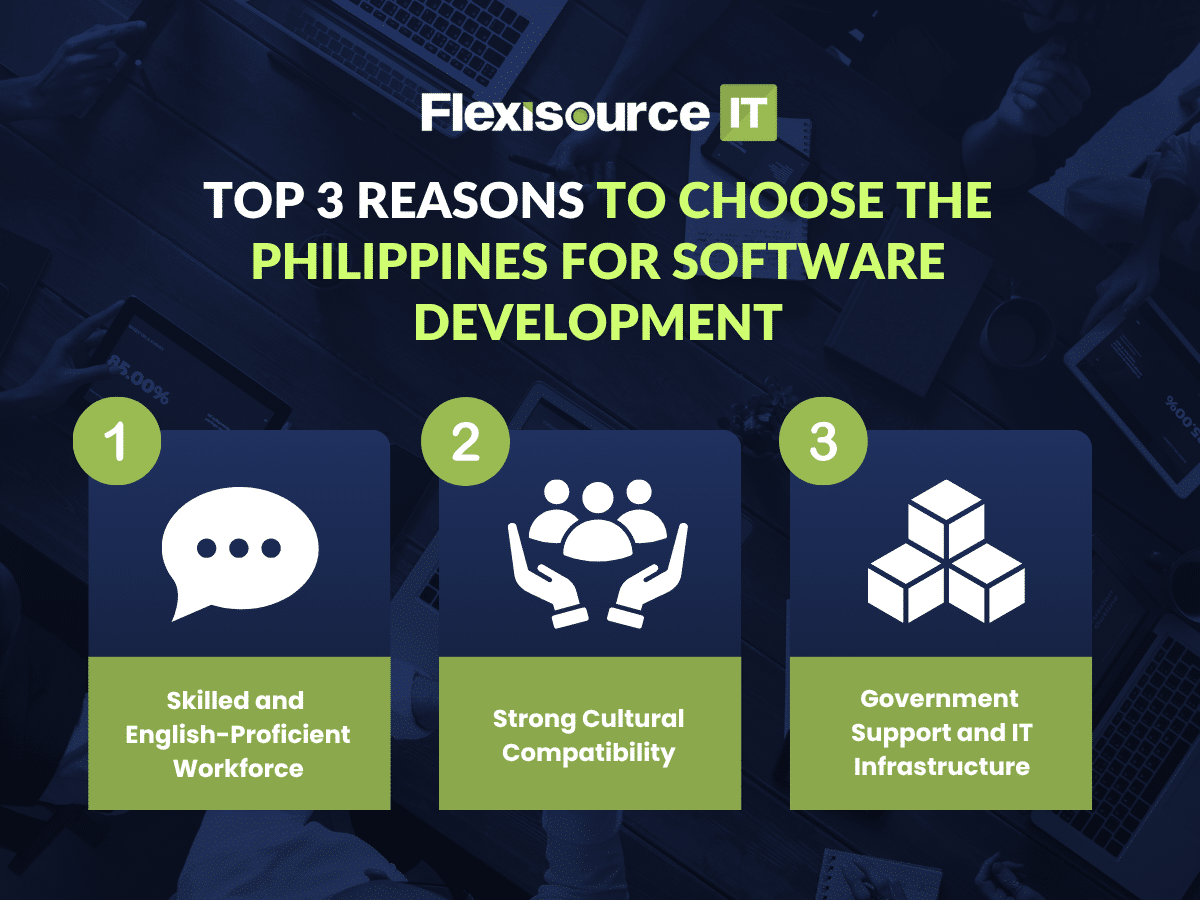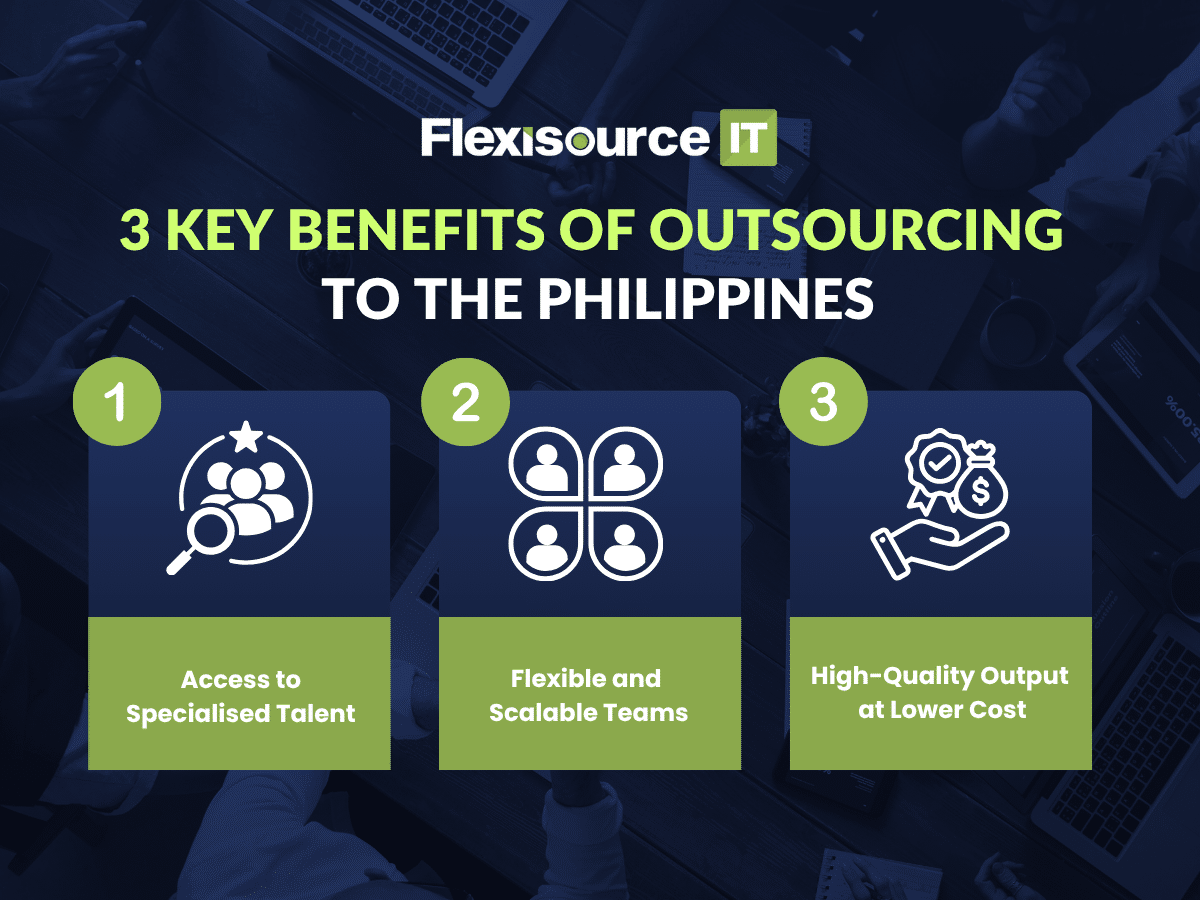For Australian companies trying to stay ahead in the market, business, or digital economy, software development is a top priority, and local talent can be hard to find and costly to retain. That’s where outsourcing became a popular and wise go-to option in this industry. The Philippines, in particular, has emerged as a trusted partner for Australian businesses seeking reliable, skilled, and cost-effective development teams.
In this guide, we’ll walk through why companies are making the shift, what to expect, and how to build a successful partnership with a Filipino development team.
Why Australian Businesses Outsource Software Development
Australia’s technology industry continues to grow fast, but local talent supply is struggling to keep pace with increasing demand. As more companies invest in digital transformation, the competition for top developers has become intense.
This reality has led many organisations, from startups to large enterprises, to explore software development outsourcing as a way to meet project timelines, manage costs, and maintain innovation.
The Growing Need for Tech Talent
The Australian market is facing an ongoing shortage of experienced developers, data engineers, and system architects. With more organisations transitioning to cloud-based infrastructure and digital platforms, the demand for specialised skills in areas like machine learning, cybersecurity, and full-stack development continues to outpace supply.
Local hiring has become increasingly expensive, with salaries rising every year, making it difficult for smaller businesses to compete with large corporations and tech giants.
Outsourcing to the Philippines helps bridge this gap effectively. Filipino developers bring the technical expertise and adaptability needed to fill these skill shortages while providing excellent value for cost. Many have experience working on international projects and are comfortable with modern frameworks, tools, and agile workflows.
For Australian companies that need to move fast without compromising quality, outsourcing offers a flexible and scalable way to expand development capacity without the long lead times of local recruitment.
Cost Efficiency and ROI
The financial advantages of outsourcing are significant. In Australia, hiring a mid- to senior-level software developer can easily cost between AUD $100,000 to $160,000 annually, not including expenses like office space, benefits, or equipment.
Outsourcing, in contrast, to the Philippines allows businesses to access highly capable professionals at a much lower cost, often saving between 50% to 70% on total development expenses. This enables companies to reallocate resources toward innovation, marketing, or other growth initiatives.
But the return on investment goes beyond simple cost reduction. Filipino development teams are known for their professionalism, attention to detail, and commitment to delivering quality results. Many firms in the Philippines operate under mature project management frameworks and international standards, ensuring that outsourced projects meet both technical and business objectives.
For Australian businesses, this translates into faster turnaround times, more predictable delivery schedules, and a clear path toward sustainable scalability – all critical elements for staying competitive in a fast-moving tech landscape.
Why Choose the Philippines for Software Development
Of all the outsourcing destinations, why do so many Australian companies choose the Philippines? The reasons go far beyond just lower costs.

Skilled and English-Proficient Workforce
The Philippines produces thousands of IT and computer science graduates every year, many from top universities with strong technical programs. Developers are trained in modern coding languages and frameworks, making them ready to contribute from day one.
English is also a key advantage. Filipino professionals are fluent in English and often have experience working with Western companies, which minimises communication barriers.
Strong Cultural Compatibility
Filipino work culture aligns well with Australian business values with punctuality, accountability, and collaboration. You’ll find that teams in the Philippines are proactive, responsive, and eager to deliver results.
Plus, the small time zone difference (usually just two to three hours) allows for real-time communication and regular check-ins, which are critical in agile software development.
Government Support and IT Infrastructure
The Philippine government has actively supported the growth of the IT-BPO (Business Process Outsourcing) sector through tax incentives and improved infrastructure.
Cities like Manila, Cebu, and Davao have become tech hubs, with reliable internet, strong developer communities, and co-working spaces that support remote development work at scale.
Common Software Development Services Outsourced to the Philippines
Companies outsource a wide range of tech services to the Philippines, taking advantage of the country’s diverse expertise across different areas of software engineering. Whether it’s end-to-end development or ongoing support, Filipino teams are known for their adaptability and commitment to delivering exceptional work.
1. Web and Mobile App Development
From eCommerce platforms to mobile apps, Filipino developers are well-versed in tools like React, Angular, Flutter, and more. They can handle everything from prototyping to deployment, ensuring that your digital product not only functions smoothly but also provides a seamless user experience tailored to your business goals.
2. QA Testing and Automation
Outsourced teams handle everything from manual testing to automated test scripts, ensuring smooth, bug-free releases. They often integrate quality assurance throughout the entire development lifecycle, which means fewer errors, faster iterations, and stronger performance once your product reaches users.
3. UI/UX Design and Product Development
Many teams also offer design services, helping you build intuitive, user-friendly interfaces that align with your brand. Filipino designers are known for blending technical precision with creativity, ensuring that each visual and interaction feels both functional and delightful for end users.
4. Cloud and DevOps Services
Need help managing AWS, Azure, or GCP environments? Filipino engineers can assist with cloud infrastructure, CI/CD pipelines, and system monitoring. They also help optimise cloud costs, automate workflows, and strengthen deployment reliability, which are key factors for scaling efficiently in today’s competitive digital business.
5. AI, Data Analytics, and Cybersecurity Projects
Advanced services like machine learning models, predictive analytics, and security audits are also available, ideal for companies scaling into more complex tech stacks. These specialised teams help Australian businesses make smarter data-driven decisions while maintaining the highest standards of information security and compliance.
Key Benefits of Outsourcing to the Philippines
The Philippines offers a unique mix of talent, affordability, and business alignment. Here’s what you stand to gain:

Access to Specialised Talent
One of the strongest reasons Australian companies choose to outsource to the Philippines is the country’s deep pool of skilled technical professionals. Whether you’re building a new product from scratch or expanding an existing team, you can quickly find experts who bring both technical ability and a strong work ethic to the table.
Here’s what makes Filipino talent stand out:
- Access to full-stack developers, project managers, and QA engineers with global experience
- Proficiency in modern programming languages such as Python, Java, PHP, and .NET
- Familiarity with widely used frameworks, cloud platforms, and agile development practices
- Strong communication skills and cultural alignment with Australian business values
These professionals combine technical skill with adaptability and collaboration, making it easier for Australian businesses to scale projects smoothly. With the right team in place, companies can innovate faster, reduce development bottlenecks, and confidently deliver high-quality digital solutions to market.
Flexible and Scalable Teams
Need to ramp up for a big product launch or scale down after delivery? Outsourcing allows you to adjust team size on demand. Choose from hybrid models (mixed onshore/offshore teams) or fully dedicated teams. This flexibility gives Australian companies the freedom to align resources with business needs in real time, minimising overhead while ensuring that projects stay fully staffed during critical phases.
High-Quality Output at Lower Cost
You get excellent value for money. Many outsourcing firms in the Philippines follow global project management standards and prioritise customer satisfaction, making them dependable long-term partners. Teams are accustomed to international quality benchmarks and continuous improvement, ensuring that deliverables meet both technical requirements and business expectations every single time.
How to Choose the Right Outsourcing Partner
Choosing the right outsourcing partner can make or break your software development project. The goal here is to find a long-term collaborator who understands your vision, communicates transparently, and consistently delivers results. A well-chosen partner can accelerate innovation, reduce risks, and help your business scale faster than hiring in-house alone.
Research and Due Diligence
Before signing any contract, one of the wise decisions is to invest time in thorough research. Look for firms with strong portfolios, verified client testimonials, and detailed case studies that demonstrate their expertise across different industries. Ask for references from past clients and take the time to verify their track record, especially on projects similar in scope or complexity to yours.
It’s also essential to evaluate the company’s technical capabilities, tools, and certifications, such as ISO compliance or GDPR adherence, which indicate maturity and professionalism. Don’t hesitate to request a small pilot project or trial phase to assess communication, code quality, and project management style before committing to a long-term engagement. This upfront effort helps ensure you’re choosing a capable, trustworthy partner.
Legal and Contractual Considerations
Legal clarity is one of the most important foundations of a successful outsourcing relationship. Protect your business by signing non-disclosure agreements (NDAs), setting clear service-level agreements (SLAs), and defining ownership of intellectual property (IP) from the start. The contract should outline payment terms, delivery milestones, dispute resolution procedures, and confidentiality clauses to prevent misunderstandings later.
It’s also wise to familiarise yourself with local labor and data privacy laws in the Philippines. Reputable outsourcing firms will already comply with these regulations, but confirming this protects both parties and builds mutual trust. A transparent legal framework ensures that your partnership runs smoothly and your assets remain secure throughout the project lifecycle.
Communication and Project Management
Smooth collaboration is only possible with strong communication and clear project management practices. Use modern tools like Slack, Jira, Trello, and Zoom to maintain real-time visibility and accountability. A reliable outsourcing partner will set up structured workflows, define key performance indicators (KPIs), and schedule regular progress meetings to ensure alignment on goals and deliverables.
Beyond tools, the human aspect of communication matters even more. Choose a team that responds quickly, welcomes feedback, and proactively suggests solutions rather than waiting for direction.
Establishing consistent communication rhythms, such as weekly syncs, daily updates, and retrospective meetings – helps both sides stay connected and agile. This kind of transparency not only builds trust but also leads to faster problem-solving and higher-quality outcomes.
Potential Challenges in Outsourcing and How to Manage Them
Outsourcing offers significant advantages, but it also comes with its own set of challenges. Recognising these early (and planning for them) can make the difference between a smooth collaboration and a frustrating experience.
By setting up the right systems and expectations, Australian companies can overcome most obstacles with ease and confidence.
Managing Time Zone Differences
While time zones between Australia and the Philippines are close, they’re not identical. Use overlapping work hours for key meetings and adopt asynchronous communication practices (like shared documents, detailed task boards, and recorded updates) to keep projects moving forward. It also helps to define clear response time expectations, ensuring both sides stay aligned and no work gets stalled during off-hours.
Ensuring Quality and Accountability
Establishing clear expectations from the beginning is key to maintaining quality and accountability when outsourcing. Every project should have measurable milestones, detailed deliverables, and consistent feedback cycles to ensure alignment at every stage of development. Setting transparent standards early not only improves collaboration but also helps both teams take shared ownership of results.
To keep everything visible and on track, many Australian businesses rely on project management and reporting tools such as:
- GitHub: for version control, code reviews, and seamless collaboration between developers.
- Jira: for agile sprint planning, task tracking, and progress monitoring.
- Trello: for visual workflow management and easy-to-follow task organisation.
- Asana: for assigning responsibilities, tracking deadlines, and managing deliverables.
- Google Data Studio or reporting dashboards: for performance analytics, insights, and continuous improvement.
These tools provide real-time visibility into the development process, helping you identify issues early, measure productivity, and maintain accountability across teams. When used effectively, they build transparency and foster a culture of continuous improvement that benefits both your local and offshore teams.
Risk Management in Outsourcing
Even with the best planning, risks like project delays, staff turnover, or changing business requirements can occur. Implementing proactive risk management strategies, such as diversified team structures, backup resources, and clear escalation procedures, can minimise disruptions and maintain project stability.
Regular audits and contingency plans also help businesses respond swiftly to unexpected changes, keeping projects on track and maintaining trust across teams.
How to Build a Long-Term Partnership with Your Outsourcing Partner
The most successful outsourcing relationships are built on mutual trust, open communication, and shared goals – not just transactional. When Australian businesses treat their outsourced software development teams as true partners rather than temporary contractors, the results are stronger, faster, and more sustainable.
Long-term collaboration allows both sides to understand each other’s workflows, values, and growth strategies, creating a relationship that consistently delivers value over time.
Investing in Relationship Management
Building a lasting partnership requires intention. Treat your outsourced team like an extension of your in-house staff by fostering open communication, scheduling regular check-ins, and celebrating milestones together. Feedback sessions, virtual town halls, and shared success metrics create a sense of belonging that boosts morale and productivity.
Beyond operational alignment, genuine human connection plays a huge role: acknowledging hard work, offering recognition, and maintaining empathy go a long way in creating loyalty and motivation. Over time, this approach transforms a simple outsourcing arrangement into a partnership based on trust, collaboration, and shared accountability for success.
Continuous Learning and Upskilling
A forward-thinking outsourcing strategy invests in their continuous growth – they don’t just stop at hiring talented developers. Encouraging your remote team to join workshops, online certifications, and training programs helps them stay updated on the latest tools, frameworks, and best practices in software development. When your partners grow, your projects benefit directly through innovation, better problem-solving, and higher-quality output.
Companies that invest in learning also build stronger relationships, as it shows genuine commitment to their partners’ professional development. Over time, this investment builds loyalty, reduces turnover, and ensures that your outsourced team continues to evolve alongside your business needs, keeping your competitive edge sharp in a rapidly changing tech landscape.
Frequently Asked Questions
Q: Is outsourcing software development to the Philippines legal in Australia?
A: Yes, outsourcing is legal and common practice. Just make sure contracts are clear on data handling and IP ownership.
Q: How do I manage my remote development team in the Philippines?
A: Use project management tools, hold regular check-ins, and set clear deliverables. Communication is key.
Q: Can I visit my outsourced team in the Philippines?
A: Absolutely. Many companies visit their partners during key project milestones or for team-building purposes.
Q: What if the quality of work isn’t what I expected?
A: Address concerns early, provide feedback, and work with teams that offer performance guarantees or trial periods.
Q: How long does it take to get started?
A: Most outsourcing firms can get a team up and running within 2–4 weeks, depending on your project scope.
Conclusion
For Australian companies looking to grow, innovate, and stay competitive, software development outsourcing to the Philippines offers a powerful solution. With a skilled workforce, strong English communication, cultural alignment, and significant cost advantages, the Philippines remains one of the top destinations for tech outsourcing.
Ready to explore outsourcing? Connect with Flexisource IT today.





